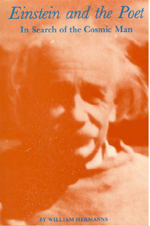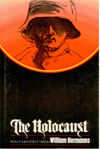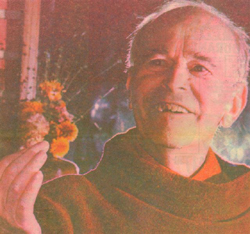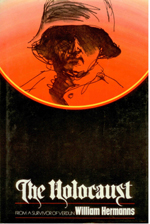
 |
|
|
Click bars for Navigation ---- ---- Published Books by William Hermanns - Click cover image for it's webpage.  ---  Out of print books available - email us Translate page
---
Like our facebook page WilliamHermanns to get website update notices and some uploaded poetry that talks to your soul. --- Please help support this website. We'll continue to upload more gems from the archives. See Contact Page to communicate with us. To My NeighborSeelentränenNavigationContact / Kontakt |
||||
|
|
EssayChange the Heart of ManWilliam Hermanns composed this essay in March 1985 , while living in Desert Hot Springs and preparing introductions to poems for a compilation. I Rise is the poem the essay introduces and it was composed the year earlier in Stanford. That compilation has not yet been prepared for publication.
Change the Heart of Man Einstein said once after class to a group of us students, referring to the swastikas that some were bearing on their lapel, that there was a danger lying ahead for us of splitting humanity into hostile groups. We are equal in our humanity, he told us. One individual is as human as the other. Shortly afterwards I was to meet Einstein again with Planck and Nernst and many other high-titled persons in formal attire in the Kaiser Wilhelm Institute at a reception. Einstein said to some of us members of the young generation: "We must change the heart of Man by mobilizing his conscience." An American student then emphasized that already the Declaration of Independence stated that we are all created equal and endowed with certain inalienable rights. In a meeting of the League for Human Rights, the question arose of how to change the human heart to safeguard the world from the apocalyptic danger of Hitler. As there is in reality no equality of personal equations, I brought up three personal experiences. One of our maids, who had been in my Aunt Veronica's household for fifty years, was never allowed to eat at our table when we had visitors. Nor was I, who studied five languages in a Gymnasium, a privileged school in Germany, permitted to play with children of factory workers, who mostly wore wooden shoes. The traditions that separated the patricians and the proletarians were so ingrained that their injustices were accepted without question, just as Hitler's atrocities would come to be accepted uncritically by many. On the other hand, I would accompany my Aunt Veronica and her maid every Friday, carrying a huge basket of food to the poor and sick, most of them suffering the ravages of tuberculosis. In my book on my memoirs of being a volunteer soldier for the Kaiser in the First World War I include this story: During the trench warfare of the snow-filled winter of 1915-16 in the Argonne Forest, I was the group leader of eight men. During the night we slept in an underground hole dug off the trenches, somewhat protected from the shells that exploded above us. As evening rations for my men, I received one herring and a loaf of bread. I could not cut the herring in nine parts, so I had the men come out of our shelter into the trench. There, I hung the herring from a piece of cord which I suspended above their heads so they could jump, open-mouthed, for the fish, while I controlled its height by tugging the end of the cord. I let the herring fall into the mouth of Napiralla, a tall Polish soldier who hated the Prussian war he had been drafted into by the conquerors of his native land. At that very moment, Lieutenant Langekamp, having watched this jumping scene from a corner of the trench, came forward in his elegant uniform with shining boots. I stood at attention in my filthy loam-covered, lice-ridden uniform. He yelled at me, "Do you dare to teach your group communism by mocking your treatment by the German army with this offensive game?" Then he walked away around a corner of the trench. I was shocked. So were my comrades. Of course, the Lieutenant had just come from his officer's dinner with soup, meat, vegetables, dessert and wine. Had he felt there was something wrong in the military system of the Kaiser's war to so deride my compassion with the word "communism"? I was to pay dearly for this. I was soon ordered to join the machine gun company, the service which had the highest death toll of all. Returning home from French captivity in 1920, no message of all the sermons and speeches from political parties that I heard struck me so deeply as the words of Einstein: "To avoid the third world war, we must change the heart of man." Thus it happened that the League For Human Rights - of which Einstein and I were members - asked me, one of the League's honorary secretaries, to collect documents regarding Nazi corruption of German justice. My documents were ignored by President Hindenburg, although he knew me personally from his visit to Frankfurt University, where he shook my hand as a doctoral student there and one of the few survivors of the Battle of Verdun, with the words: "There will come a time when we avenge this defeat." The principle of synchronicity or meaningful coincidences caused me some thirty years later to meet Franz von Papen. At the time I had sent the documents he was an intimate advisor of Hindenburg and, for a time, Vice-Reichskanzler. He, nearly ninety, invited me to dinner at his wonderful mansion near Baden-Baden. I could not help but mention this defeat of justice under Hindenburg's presidency. Whereupon Papen declared that Hindenburg belonged to a family that for centuries served the Prussian kings in their wars and hoped that under Hitler the army, led by the aristocratic generals, would be returned to its old prominence. Von Papen then invited me in one of his elegant drawing rooms to stand in front of a huge painting. "This a scene of the war of 1870," he told me. "On this horse you see my father leading a cavalry charge against the French cavalry. With his lance he is piercing the chest of the officer spearheading the attack." I gazed on transfixed, horrified. Von Papen had just shown me in another ornate room some decorations of the pope whom he had served as Papal Chamberlain. Here was a religious Catholic, who told me that every morning he attended a private Mass, taking pride in the immortalization of his father killing a French soldier in a war begun by the Prussian. And all this, in spite of his having been arraigned in court and having spent years in detention for having helped Hitler to power. What a problem it is to change the heart of man! "If we fail," Einstein said to me shortly before his death in 1954, "Armageddon will befall us."
I
Rise
I rise into infinity to ban the atomic fate. I take you along, and you and you, before it is too late. Each stage of afterlife we conquer when our soul begins to chant. Who said, "You can do greater things than I."? Don't answer, "Christ , I can't." Once, as the Kaiser's volunteer, I, German hero, marched to battle. It whispered, "You embrace the curse: a million slaughtered like cheap cattle." I listened and embraced my soul. My vow betrothed infinity for three generations. Atoms knock now at my door. Youth follow me. William Hermanns [P426] Note: PS2, part of poem compilation with introductions, Stanford, 3/27/1984, a840522, b840525, c850613; P426 I Rise; Desert Hot Springs; January 14, 1985 (WH wrote, "Last night Ken meditated with me as always before going to bed, then read a chapter from Eckankar discourse. At 7am I woke up and took the pen."), C850317, i850326; WH note: "Add the introduction of the story of Leutenant Langenkamp feeding two Polish soldiers with one herring. We cannot master the nuclear danger on the three-dimensional level. Einstein said that the heart of man will change our fate, not alliances between nations."
|
Please support
our sponsors. Click on image to be directed to their website ~~~~~~~~  ~~~~~~~~  ~~~~~~~~  ~~~~~~~~ Norton & Holtz Business Solutions  ~~~~~~~~  ~~~~~~~~  ~~~~~~~~ Published Books below: Click cover image for it's webpage:  Available at Amazon. For Hardbacks Contact us. ---  Inquire on out of print books ~~~~~~~~ |
|
|
|
|
|
|
||
|
Prose and Plays |
|
Poetry |
|
Events |
|
Website Info |
Website © Copyright 2011-2022 by Kenneth E. Norton Articles by William Hermanns (c) by William Hermanns Trust |
||||||